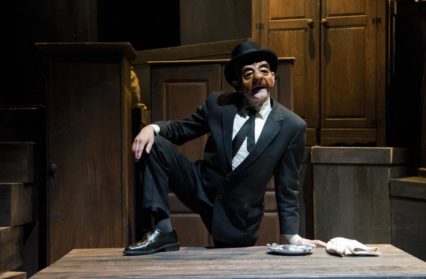Dylan Moore reviews National Theatre Wales’ production of The Dark Philosophers by Gwyn Thomas, one of Wales’ most influential cultural figures.
‘I think he’s great,’ said Dylan Thomas of his namesake Gwyn Thomas, ‘but then I’m very chary of using words like great. And words like chary.’ Begrudging praise is praise indeed and perhaps the more famous Thomas identified a kindred spirit in a man who believed ‘every Welshman is a mobile theatre’ and that ‘[Wales is] a very dramatic society, there’s no doubt about that.’ National Theatre Wales’ production of The Dark Philosophers, ostensibly a theatrical interpretation of Gwyn’s cycle of tales from the late 1940s and early 1950s, is rather a celebration of the man and his work, a nod of appreciation in the direction of one of twentieth century Wales’ foremost cultural figures.
Born in the Rhondda valley in 1913 (‘the next year,’ he said, ‘was even worse’), the youngest of twelve children, Gwyn Thomas went up to Oxford looking, in his own words, like ‘a cross between Humphrey Bogart and a shrouded dwarf’. One of the play’s many hilarious tableaux depicts the author as ‘a small stunted Welsh specimen’ discovered in a bowl of soup. The constant feeling of being out of place shaped his star and powered a polymath. Told By An Idiot and co-writer Carl Grose capitalise on Thomas’ gift for one-liners and it is the author himself who suffuses the script with a potent blend of humour, sorrow and darkness.
Angela Davies’ set, a stack of old wardrobes, drawers and chests piled higgledy-piggledy as a mock-up mountain, immediately captivates. Coal falling from the sky helps draw us into a larger-than-life, surrealist world. Welcome to The Terraces, home of ‘strange fruit in the shape of folk’, a cast of characters capturing the essence of Gwyn Thomas’ own dark philosophy: ‘absurdity is the most beautiful thing’.
Meet Simeon, goat farmer, widower, murderer and abuser of three frightened daughters; and Agnes, who wore out forty men before settling on Uncle Cadwallader; meet Lewis, big and dark and strong and doer of Oscar’s dirty work (well, it’s a job). Meet Hannah Lewis, the latest woman desired by Oscar, and Danny, jobless and poverty-stricken, ‘defying the world by not paying for coal’. And finally, meet Oscar himself. Owner of the mountain, dark overlord of the terraces, a huge, fearsome man who casts his enormous shadow over the entire community, as if he himself is the mountain, crushing those beneath him (often literally).
Told By An Idiot’s Oscar is overbearing and callous, ridiculous and truly evil, often all at once. A ‘dark halo’ surrounds his heart. The giant puppet that represents him vomits loudly and crawls drunkenly along the floor to howls of laughter and recognition. Representing violence, vice and exploitation, Oscar is everything that made the South Wales Valleys a miserable place to be in the mid-twentieth century. The microphone used to put words in his mouth makes him a Wizard of Oz figure, his enormous power built on fear alone.
The voice is provided by a mysterious man in a mask. He stalks the stage throughout the performance, talking directly to the audience, whispering in characters’ ears, telling them what to say. And it is he – not Oscar – who holds the real power. When his identity is cleverly revealed, roughly halfway through an interval-less performance, it takes what is essentially an enjoyable collection of sketches onto a whole new level. There are bursts of song, secular and religious, from opera through jazz to folk. Laura Rogers, who plays virtually all the leading female roles, steals several scenes with a sultry, smoky melancholy. At other moments fine-tuned physicality is combined with absurdist wit. Two miners crawl across the stage with their picks: ‘let’s go down as perpendicularly as we can.’ There is an episode of Parkinson featuring impressions of the host with Billy Connolly and Dolly Parton.
But it is the revelation of the man in the mask that takes this play into the socio-historical sphere and, for me, makes The Dark Philosophers a real highlight of the National Theatre Wales first year programme. ‘The world has lost its moral sense,’ claims a gossiping housewife as the play draws to its ‘sad, beautiful’ conclusion, not unreasonably considering what we have witnessed. The reply comes quickly and encapsulates the Gwyn Thomas worldview: ‘What’s wrong with that?’
Lots, of course, as Gwyn Thomas well knew. But after this fitting celebration of his life and work, it would be churlish not to use a word like ‘great’. Although I am very chary…
Dylan Moore has contributed regularly to Wales Arts Review.












